Donjon by Echophonic
Introduction
Original SA post Donjon - A game of old-school roleplaying with an all-new bentA game by Clinton R. Nixon.
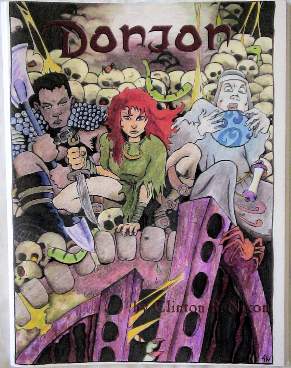
Yeah, the art generally looks like that, except better because it's not in colored pencil. Most of the time, anyway. Better, I mean.
I may have been exaggerating a bit when I said this was the most pretentious game I've ever read. Just because the title's in French doesn't mean the game is pretentious. It's the sidebars about the 'right' way to play that make it sort of pretentious. It's all sorts of grognards.txt arguments under all the storygame fluff. It walks an odd line where I can't honestly tell if the guy is kidding or not. He claims it's not satire, at least. At least it's not The Secret Fire, where you KNOW that was deathly serious. Also this one claims to have been playtested (by 5 people).
Also of note: The game was released under the Creative Commons Attribution-Share Alike 2.5 License, so the full text can be found on the author's website if you want to read along.

The book opens with a chapter on how the game came to be and what it's about. It lacks the obligatory 'What is a roleplaying game?' explanation, instead opting for a Ron Edwards summary. Behold:
The book posted:
The best analogy for this is given by Ron Edwards, a bad-ass of a game designer. He likens playing a role-playing game to being in a band: the members get together and decide what kind of music they want to play, one person (the GM) leads off, and the rest of the members add what they have to make something that is, hopefully, exactly what they wanted. Just like with playing music, one member of the band might find a cool riff that no one was expecting, and everyone else jumps on it. Donjon is like acid jam-rock. It's made to give players a lot of control: they can bust into guitar and drum solos whenever they wish. If something sounds groovy, then they can go with it. There's no band-leader here to bust your chops.
Acid jam-rock smilies aside, apparently " Donjon is a rip-roaring, make-it-up-as-you-go-along game of bashing down doors, exploring dark dungeons (or donjons, as we like to call them), killing monsters, finding loot, and saving the day." This sounds pretty reasonable and is backed up pretty well by the rest of the book.
It's not what the game's about , mind you. That's answered later. John Wick would be proud.
There's a short play example where Nixon relates what inspired him to create this game. Long story short: He makes a find secret doors check, says he succeeded, then his GM fudges a secret door out of nowhere. Then Nixon was enlightened and they started having fun by having successful rolls alter the world to match the result. You roll to hear a noise? Noise is heard. Want to roll the orcs for a magic sword? Lucky you! And so on. Sounds like a pretty cool way to see what sort of things your players want to be doing to me, so I'm not gonna bash on it at all.
Now, the question we've all been waiting for. What is this game about? " This game is about, first and foremost, that sense of wonder you had the first time you played a fantasy role-playing game. " It's about letting players come up with cool situations and actions. It's about a GM screwing the players.
Wait... What? I'm going to let the ending paragraphs speak for themselves:
Clinton R. Nixon posted:
Lastly, this game is about winning. Don't be fooled by the fact that you're all friends: the GM's job is to take whatever you say and twist it around and screw you with it. Think of the GM as a genie - an evil one. You make wishes, and he tries work them to his advantage. The players' job is to not let the GM do this: think of cool actions she can't thwart, build characters that are engines of fun destruction, and smite down all the enemies she can throw at you.
This game is different than what you're probably used to - if you're a hard-core dungeon crawling machine , you've probably not seen mechanics that allow players to drive the situation like these. If you're some sort of narrativist bleeding-edge pansy that's used to having players run everything, you've probably not had the chance to wallow in the blood of your enemies like this.
Since these are both pretty short chapters, I'll do them both here.

This is your standard game jargon chapter. Introduces the various sidebars (Player/GM tips, design decisions, tables), including Dials. Dials are sidebars that give you various ways to tweak the rules to make it more fun for your group. Then there's the Glossary.
So, according to this glossary, creatures have Abilities , Attributes and either a Class or Race . Straight OD&D right here. We'll come back to these later in the next chapter. Similar to a lot of other story-games, action is framed by scenes . Scenes are your usual combat, NPC interactions, exploration, and the like. The core of any good Donjon game, though, takes place in a
Here's where the fun starts and we get to learn how to play. This is a dice pool game. This is also a game played with d20s. This is a d20 dice-pool game. Apparently I'm not the only one balking at this, apparently, so have a Dial sidebar:
Dial: Die Size posted:
Twenty-sided dice do not have to be used in Donjon. A group of players may use any size of dice as long as they all use the same size.
The size of dice makes two differences in the game: the variation of successes, and the amount of ties. With a smaller- size die, there is a slightly greater chance that a player rolling a smaller number of dice than another player will win anyway. With twenty-sided dice, the outcomes are more predictable. The increased frequency of ties that comes with smaller-sized dice causes the number of successes in any Test to be higher.
Make sure and decide what size of dice you will be using before the game begins. Using sizes other than twenty-sided is frowned upon by the author, however, and "pure" Donjon players may feel free to mock dice deviants relentlessly.
How many d20s does the average gamer even have? I have a lot, but I like buying dice (and weird RPGs).
Basically, you roll dice and compare pools. Higher unmatched dice are successes. The sidebar above saying d20s give you more predictable results starts to make sense. So, to use the books example, roll 4, 7, 9, 11, 12 and the GM rolls 6, 12, 15, 18, the GM has 2 successes. Tied high dice get removed and the next highest is checked. The winner keeps all the high ties. So in the earlier example, if the GM rolled 8, 9, 11, 12, they'd get 4 successes, 3 from the ties and winning with the 8. Pools are generated based on stats and abilities, we'll talk about that more later.
Here's the game's core mechanic. The Law of Successes. One success = 1 fact or 1 die. This means in our first example, the GM would get to make 2 statements about the scene or use it for 2 bonus dice on a later roll. A pretty neat mechanic to base the game around. There's a lot more about what a 'fact' actually means in the later chapters.
Next time: Chapter 2 - Character creation. And, finally, some art!
Reader Participation Time! Give me a few suggestions for what our hero should be and I'll see what I can work up. We'll be using the variant on the "standard" method for character generation, which the author admits to including out of "nostalgia and respect". It's 3d6 down the row, but with a Donjon twist.
I gets my scrilla from pimpin...
Original SA post Donjon - I gets my scrilla from pimpin...
Initial Concept
The chapter opens up with a section on coming up with a concept for your character. This includes personality and a bit of backstory to help guide your build. Why this is the first section of character generation for a game that encourages random stat generation I have NO idea.
However, it does have one of the better Dial sidebars so far. It's fairly obvious, but it's nice to see it included. Basically, make sure everyone's on board for the same kind of game, humor- and grit-wise. Anything from Monty Python to 'rust-and-blood fantasy horror', but make sure nobody's going to screw up the mood by cracking wise too much if you go the latter way and play a game that everyone can agree on. Good stuff here.
Attributes
Before we go off into the wilderness of making our multi-weaponed, highly connected anime corgi, let's talk about Attributes . Attributes are your normal ability scores, but they're a little spéciaux .
I'm going to go ahead and steal a table from Chapter 4, so you can see what certain ones are for. This would be useful earlier, though they do basically do what they say on the tin.
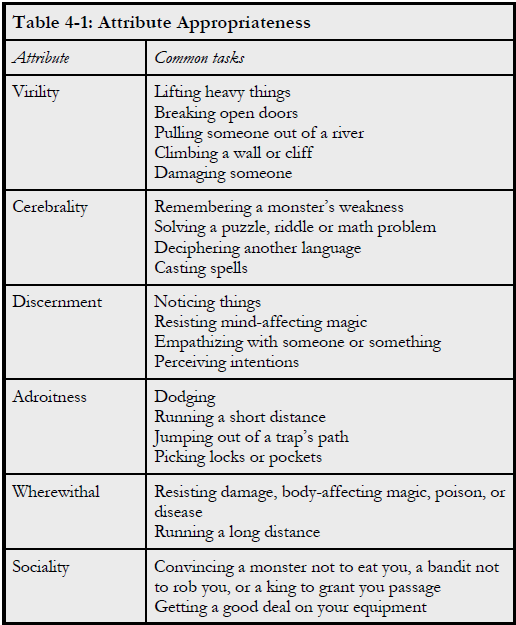
They line up with the usual 6, just with fancy names. Wherewithal is basically Constitution, but it includes the mental fortitude bits of Wisdom and Charisma. Nothing too insane, but these are supposed to be generated randomly. Not even the sample characters use this method, as an aside. They use point buy. Want to know what the author thinks about point buy? Sure ya do!
Nixon posted:
The[sic] [Dial] setting gives the players the most options, but can produce characters with wild attributes.
The other options on the Attrubute Generation Dial besides Standard are
-
Whiff-Proof Standard - If your stats are bad, you can reroll the set.
-
Player-Allocated Bonus - Can can swap a single point from one Attribute to another.
-
Player Chosen Random Rolls - Standard or Whiff-Proof, but you can pick which stats get which number. This is what we'll be doing.
-
Player Allocated - Point buy, this is what all the sample characters do.
Ok, now that we know what Virility and Sociality DO, here's how you get the numbers. I know I said it was 3d6 earlier, but it's not what you think. You roll 3d6 and take the median die. Median. Luckily this is explained in the Glossary, making damn sure to let us know it's not the mean. I have no idea why you'd pick the median of three dice, but I do like that this keeps most rolls under 10 dice and you don't have to mess around with figuring out your stat modifiers. Let's roll up some stats for our hero. We'll use Player-Chosen Random Rolls, since I have an idea of what we want here.
My dice posted:
2 4 6 - Giving us a 4
1 2 4 - So a 2
2 2 3 - Another 2
4 5 6 - a 5
1 4 5 - a 4
3 3 6 - a 3
This adds up to 20 points.
Alright, so just so you can follow along, here's a link to the character sheet . There's something subtly wrong with the design that I'll point out later. Additionally, it's ugly as sin and the font is terrible. Also this on the copyright line:

Classy. This would make a pretty great Aspect for a gritty near-future game, actually.
Now that we have our stat points, let's divvy them up for our hero. I think someone quick with high sociality would make a good knife-wielding dog hitman. These are going to be added to all relevant rolls. He's going to be pretty effective on offense and dealing with people, but he's a little squishy and not very bright.
Virility - 4
Cerebrality - 2
Discernment - 4
Adroitness - 3
Wherewithal - 2
Sociality - 5
With that done, we can move on to the next part.
Class and Race
Characters can have a class OR a race. Think back to the good old days when you could be a Fighting Man, a Magic User or an Elf. All of this is made up on the spot and helps you determine Abilities later on. When you pick a race, you're actually adding that race to the world. I dig this part. There's a dial sidebar about doing races other than human, which is fine if you want a dwarf delvers or troll raiding party kind of game. This is supported by the author. On the other hand...
Nixon posted:
The GM may also allow all species to have diverse classes. In that case, races work slightly differently: all members of a race (except humans) have the same Main Ability. All characters are assigned a class (so you might have, for example, a Rock Troll with the Class Mountain Raider), which is how their Secondary Abilities are determined.
In all honesty, this is an inferior way to play Donjon and should be frowned upon, but the good heart of the author forced my pen to give you the option.
Ok, so we know we're playing a Corgi. That will determine our Main ability, and we'll do the mafioso thing with Supporting abilities. On that note...
Abilities
Ok, in order for our corgioso to really shine, he's going to need some abilities. You get one Main Ability and 4 Supporting Abilities . Main abilities are core to your race or class. Supporting abilities are other things you can do.
Here's a few examples. Bold is the class/race, italics is the Main Ability.
-
Mercenary
:
Hit People With Weapons
, Run and Charge, Knock Down Doors, Intimidate, Take Damage in Melee Combat
-
Purple-Robed Sorcerer
:
Cast Spells
, Understand Demon Languages, Avoid Magic, Lie Convincingly, Damage Demons
-
Granite-Bone Troll
:
Take All Sorts of Damage
, Play Dumb, Eat Rocks and other Hard Things, Leap Across Chasms, Hand-smash
-
Elf
:
Be One With Nature
, Cast Nature Spells, Use Bows, Attack with Longswords, Find Secret Doors
-
Noble
:
Influence People
, Knowledge of Heraldry, Dodge in Melee, Bargain with Authorities, Ride Horses
There are a few guidelines for Abilities. Main abilities are REALLY broad in scope, Supporting are more specific. Like Mercs can use that ability for any weapon, but elves only get bow and longsword bonuses. Let's go back to the book.
quote:
A Main Ability should affect all of one type of roll - all attack rolls, all damage rolls, all influence rolls, or all attempts to hide. A Supporting Ability should be constrained so that it only works in specific situations.
We're also reminded that out abilities let us narrate what happens during encounters, so pick stuff that lets you control the parts you want. We'll cover the ability to case spells later (chapter 6), so we'll do a roguish type for now. Just to give you an idea, you get keywords to build spells out of. Fire, cloud, mind, demon, squirrel, whatever you want. Main spellcasting gets 4 to start, Supporting gets two. You have to use all the spell keywords in the name of the spell you make up. Summon narwhals made of acid to smite your enemies. If you just want some sort of one-off ability like creating light or punching with fire, you can just take it as a Supporting and be done.
Ok, so let's finally pick some Abilites for scrappy little.. uh.. Don? Don the Knife? I got nothing, you guys brought him home you can name him.
Main ability: Kawaii - Don is just so cuuute
 , don't you just want to pet him? We'll use this for a bonus to all social rolls.
, don't you just want to pet him? We'll use this for a bonus to all social rolls.
Supporting Abilities:
-
Uncanny Dodge - basic rogue ability, should help him avoid taking hits to the face.
-
Nose for Loot - Let's find cool stuff all the damn time!
-
Use Knife - Should work for any combat with a knife, backstabs, etc.
-
Well-connected - He knows people,
see?
Yeah, pretty standard Rogue, but I think it'll do.
In addition to all of those, all characters have Wealth and Provisions. There are also two Saving Throws and Flesh Wounds (health). Your two saves are (I am 100% serious) 'Save vs. Illusion & Confusion' and 'Save vs. Poison, Paralization, & Transmogrification'. Will and Fortitude, basically.
You have dice to distribute to show how good you are at the above. Wealth and Provisions are easy. You have a 3 and a 5, pick one for each. We'll do 5 Wealth and 3 Provisions.
You get 20 dice to break up between your saves, your health and your skills. Yeah. Your skills and your health come out of the same pool. So you can be tough but crappy or skilled and fragile. If you wanted palsy for roleplaying purposes, this is where you gimp the shit out of yourself.
You can only have your level+3 in any of them. We want to be able to control social situations, so let's put 4 points in Adorable. I like the idea of being able to pick pockets for neat stuff, so let's put 3 in Nose for Loot. Let's put 2 in everything else. He has high enough Virility to do well with a knife and reasonably good Adroitness for dodging. This leaves us 7 for our saves and wounds. Let's do 3 Flesh Wounds and 2 in each save. Little fragile, but is going to dominate in social situations and finding awesome loot.
Next up is equipment. But that's for next chapter. For now I'll just leave you with our sample characters.
First up is
Roland the Wilderness Scout
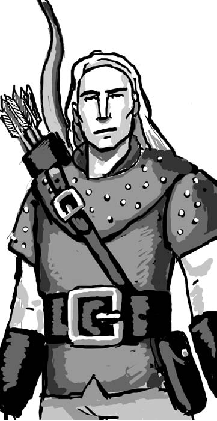
Attributes: Virility 2, Cerebrality 3, Discernment 6, Adroitness 5, Wherewithal 3, and Sociality 2
Class: Wilderness Scout
Main Ability: Track Anything (4 dice)
Supportive Abilities: Sneak in Forests (3), Climb Trees(2), Swing Machete(3), Wild Animal Lore(2)
Misc: Will (1), Fort (2), Flesh Wounds (3), Provisions (5), Wealth (3)
Next is Azar the Purple-Robed Sorcerer
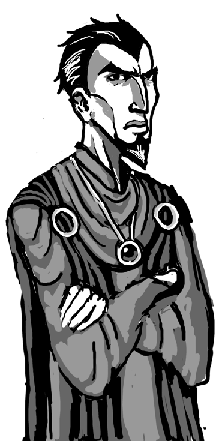
Attributes: Virility 1, Cerebrality 6, Discernment 2, Adroitness 3, Wherewithal 5, and Sociality 4
Class: Purple-robed Sorcerer
Main Ability: Cast Spells (4 dice)
Supportive Abilities: Understand Demon Languages (2), Damage Demons (2), Avoid Magic (2), Lie Convincingly (3)
Misc: Will (4), Fort (1), Flesh Wounds (2), Provisions (3), Wealth (5)
And last and certainly least:
Fiera the Snap-Toothed Dragonkin
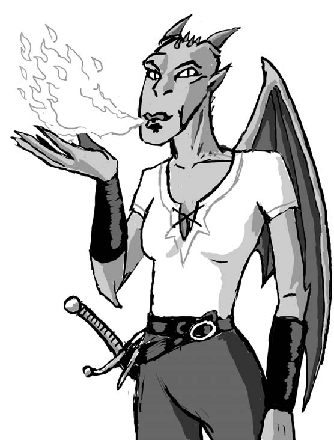
Attributes: Virility 5, Cerebrality 3, Discernment 4, Adroitness 4, Wherewithal 4, and Sociality 1
Race: Snap-Toothed Dragon-Kin
Main Ability: Breathe Flame (3 dice)
Supportive Abilities: Thick Hide against Blades (2), Resistant to Fire (2), Intimidate People (2), Regenrate Adroitness Damage (1)
Misc: Will (2), Fort (2), Flesh Wounds (4), Provisions (5), Wealth (3)
And here's us:
Don the Knife
Race: Anime Corgi
Attributes: Virility 4, Cerebrality 2, Discernment 4, Adroitness 3, Wherewithal 2, and Sociality 5
Main Ability: Kawaii
 (4 dice)
(4 dice)
Supportive Abilities: Uncanny Dodge (2), Nose for Loot (3), Use Knife (2), Well-connected (2)
Misc: Will (2), Fort (2), Flesh Wounds (3), Provisions (3), Wealth (5)
Let's Go Shopping!
Original SA post Donjon - Let's go shopping!
I hope you like d20 dice pools! Because I'll actually be rolling for us buying shit later. I hope the 8 d20s I could round up are enough. They aren't.
Alright, so we all know Don Corglelone. D'aww. We only care about 3 or 4 things off of his sheet for now. His Main Ability, his Sociality, his Wealth and his Provision.
There are three classes of Possessions. These are Weapons, Armor, and Other. Items can be Permanent, also. These persist from adventure to adventure. Anything that's not permanent is erased from your sheet when you head out. So make damn sure to try to hock all your crap.
Possessions have one score that counts for basically everything. Worth. What something is Worth refers directly to how many dice it gives you. Weapons use Worth to determine Damage Rating and Weight. Armor has the same, but are applied on opposite sides of a damage check. We'll talk about this more in chapter 5, Combat.
Sidenote: I am not looking forward to chapter 5. Combat is a mess .
Shopping for Permanent Items
Alright, so earlier we figured out that Don Corgleone will be using pretty standard rogue junk, so let's get him a sharp knife. Let's make it a DR 1 weapon, it's a little longer and way sharper, since it's made of Hanzo steel. Our first permanent item is a Hanzo steel knife.
Armor works in the reverse. We want our little mutt to be able to avoid damage and look good doing it. I think a Really Nice Suit will do the job. It's Italian, so enemies will be loathe to damage it. Plus he's got some reinforcement in case rivals try to shank him. This is about equivalent to studded leather, and will be Weight and Damage Rating 2.
For our 'Other' item, I really have no idea. I'd like some more thread input on this one. The book offers NO guidance for what to do here. The examples are all weapons and armor. I suppose things like lockpicks and field guides go here. Useful stuff you want to always have. Maybe lodging would count, too. There's no guide to how much you can have, Worth-wise, on these starting items. I guess it's Donjon Master fiat.
Now, the Weight of a given weapon or armor is important. If your weapon's Weight is higher than your Virility you lose the difference in dice for your attack roll. So our Virility 2 Woodsman upthread can't use a longsword (DR/Weight 3) without a 1 die penalty. Armor's weight impacts Adroitness. You lose the difference between Weight and Virility while wearing it. So he'd lose 2 Adroitness if he was wearing DR 4 platemail. Only stuff you're using has this effect. You can carry the platemail with no penalties.
The best way to deal with encumbrance: Ignore it. So points to Donjon here.
Using Wealth
If anyone else has read/played d20 Modern, Wealth will seem familiar. You use it to buy items. However, in Donjon only successful attempts to buy things cost Wealth.
Wealth can be used for all sorts of stuff. Let's try to buy our dog some lunch. Meals are considered 'cheap stuff'... actually, hell. Have a table, we haven't looked at too many yet.
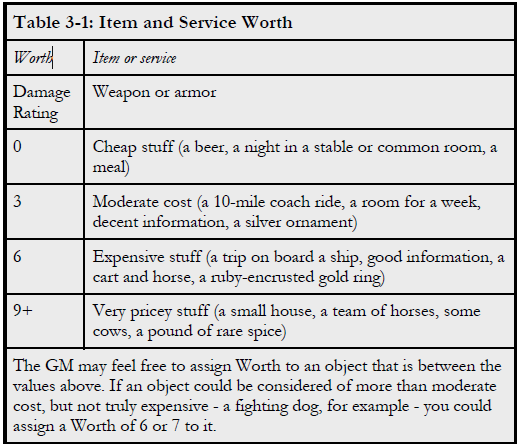
Yeah, so how much stuff costs is basically up to the DM, which is fine.
So, something of note is that towns and merchants have a stat called Markup. This adds dice to the opposed check to get stuff from that merchant. We'll say our town is moderately sized and we're at a nice restaraunt. According to Chapter 7 (the DM chapter) the average markup is 3. So we'll have our nice lunch be at markup 4. Towns normally have caps on how valuable the various things you buy can be. So you can't get fancy, expensive crap or too many Provisions at a logger's camp in the mountains, but the capital city could have jewelry shops a-plenty, but you'll be playing more for the privilege. Or the shopkeeper (read: DM) could be an asshole and increase the Markup.
So, let's get lunch. I'm rolling real dice and using dicelog.com (as arbitrary and cruel as any Donjon Master, to be sure) to oppose. Your dice pool for buying things is determined by deciding how many Wealth dice you want to spend. You can choose none if you think you can get away with it. More dice = more success chances, though. So big ticket items cost Wealth, in general. We want to make damn sure we get that lunch, so let's put a Wealth die in. We then add Sociality to that pool. So far it's 6 dice. Now, Kawaii counts for all social rolls, so we get all 4 of those dice. We have a 10 die pool for buying lunch now. I only have 8 d20s.

This is, of course, opposed by the GM. The pool they get is Markup + Value. Meals are 0, so it's just 4 dice.
Here's the rolls. Successes bolded.
Me - 3 4 4 5 5 7 10 14 17 20
GM - 3 5 5 15
We only got 2 successes out of a 10 die pool. Two.
The Law of Successes does not apply here. If you get any successes at all, you get the item and pay your Wealth dice. If you don't get any successes, you can't get that item from that merchant, info from that snitch, etc until your GM has decided something's changed.
You can also bribe people. This is Wealth spent + Sociality vs NPC Wealth + NPC Discernment.
Selling Items
You can also sell and trade items. You roll Value of the item + Sociality vs your current Wealth + Markup. Any successes are added to your Wealth score. If you fail this check you get nothing and the item is sold for no Wealth profit. Basically, you didn't get enough to increase your Wealth appreciably.
Trading is similar, but you use the item's value as a bonus to the roll to buy. So a nice 7 value ring will help a lot to buy anything you want. I think this is better in general, and the book agrees.
Buying Provisions
Provisions are important. They represent how not-screwed you are in a donjon. This game does not want you tracking 10 foot poles and spools of rope. It's all abstracted down to your Provisions score.
Nixon posted:
This sort of litigious bookkeeping is for lesser games.
We only have Provisions 3. Let's buy some more!
Buying Provisions is like buying anything else. You roll your Wealth spent + Sociality vs your current Provisions + Markup. Successes each increase your provisions by one. We'll keep the Markup 4 for this test and spend 3 of our 4 remaining Wealth. 12 dice for us, 7 dice for the GM
Me - 1 3 3 6 6 9 11 12 12 15 19 19
GM - 1 2 7 11 11 15 18
Two successes when my pool was almost twice as big? We now have 1 Wealth and 5 Provisions. Let's stop trying to buy shit, clearly it's stupid to continue.
Using Provisions
I'll admit I like this idea somewhat. If you want to say you have an item to give yourself a bonus, you can make a Provisions check to get it and get that sweet, sweet bonus. Provisions are spent like Wealth. The example is a lockpick to get +2 to open a lock. You just roll Provisions spent + Cerebrality vs 3 + the bonus you want/Worth of the item + 3 if you wouldn't normally carry it or it's too big/expensive. The example is a troll with a lute, which I think is a little bit racist. So, let's steal the example and get a lockpick that'll give us +2 and spend all 5 Provisions + 2 Cerebrality vs 3 base + 2 bonus.
Me - 3 3 4 10 14 16 19
GM - 1 7 9 9 20
So no, no lockpicks. We spent almost all of our money and just burned all of our provisions and didn't get a damn lockpick. We can't try again until we increase our Provisions. This leaves us with Wealth 1 Provisions 0 and we're stuck at a locked door.
Donjon , ladies and gentlemen.
My New Year's Resolution is to never play this game.
Original SA post Donjon - My New Year's Resolution is to never play this game.
Welcome to Chapter 4. We got a taste of what this game considers a balanced conflict resolution during our shopping spree earlier, but it's time to dig in proper.
As we've learned so far, Donjon uses an opposed d20 dice pool system for determining successes. They're referred to in the text as Tests, so I'll use that going forward, but it's an opposed check at its core. I glossed over how the pools are determined in general last time in favor of just showing the relevant pools and how they're built. Let's go into some more detail, shall we?
In true storygame fashion, Tests are only called for when someone wants something to happen. Walking down a hallway isn't a Test, but searching for secret doors is. At any time, a player or the GM can call for a test.
Now, in order to build your dice pool for a Test, you use an appropriate attribute (I'll repost that chart from earlier here for reference), one Ability, and any relevant item Abilities. So picking a lock would be:
Adroitness + <relevant rogue-type Ability here> + <bonus from picks/other items>
Here's that table for what Attributes are used for what sorts of things, they're fairly self-explanatory.

It's very FATE-like in that you only get bonuses from stuff you decided your character is good at or has on their person. On the other hand, FATE uses static difficulties for uncontested actions. Uncontested actions in Donjon ? Opposed dice pools. Surprising, no?
Uncontested Actions
As I mentioned earlier, donjons have Levels. This is your base difficulty for uncontested actions and other dungeon things. It's elaborated more later. This book is arranged in a really bass-ackwards way. It sort of expects you know what sorts of things Levels and Markup mean, when they're only really referred to in the GM section. It works like Markups for items in towns, in that it affects the size of the pool the GM gets to screw you with.
Let's have an example:
Chapter 4 posted:
Robin wants his character, Roland, to swim across a fast-flowing underground river. The most appropriate Attribute for this is Virility, and Roland has no Swimming Ability, but does have a magic ring with the Ability "Magic: Float in Water 2," which is appropriate. The current Donjon Level is 2, and swimming across this particular river is a Hard task.
Robin will roll 4 dice (Roland's Virility of 2, plus 2 dice for the ring) and the GM will roll 8 dice (Donjon Level 2, plus 6 dice for a Hard task.)
The player's pool is pretty straightforward. The Donjon Level and Task Difficulty are basically how hard the GM wants things to be combined with how much narrative control the GM wants. The difficulties are Easy (+0 dice), Medium (+3), Hard (+6), Very Hard (+9), Crazy (+12). Strangely, all of the examples are climbing various things, from a fence at Easy to glass at Crazy.
The book doesn't actually try that swimming Test out, so I'll do it for them. I'm using the 3 d20s I keep in my normal dice bag.
Player - 1 6 15 19
GM - 4 5 8 10 20 20 20
Keep in mind The Law of Successes:
quote:
1 success = 1 fact or 1 die
Now, that's a donjon-hazard based Test. Players can also put forward tests, such as "My character is peering into the darkness." In this case, successes let the player narrate what they see. The GM gets a pool based on the DL and determines difficulty based on how much narrative control they want. From wanting the player to tell you what's there at 0 to nigh-on full control at 12.
Contested Actions
Contested actions are pretty similar to Uncontested, the only major difference is that the pools are determined by the NPC's Attributes and Abilities. The book uses an example of catching a running goblin scout. This is effectively an opposed Adroitness Test, but the goblin could have an Ability for running away or the player could have magic boots. Tests are still that lovely opposed d20 dicepool roll, so even if you have three times as many dice, you can still lose pretty badly.
The Law of Successes and Narration
Personally, I think this is the core of the entire game. This is how you apply the Law of Successes. When a player wins a test, they have two options. One is to take them as a bonus to a related action, as discussed above. The other option is to trade them for some narrative control.
This is done by turning each success into a discrete fact about the character's success at the test. This requires some creativity and I actually really like the way this works. The player lays out their facts and the GM narrates the results, making sure to use them all. They can elaborate or add to the facts, as well.
On the other hand, if the player loses, the GM can take dice as a later bonus or state facts about the player's failure. The player then has to narrate, using the GM's details, what happened as a result of their failure. The GM gets veto power if the player pushes it too far to get an advantage. Basically, if they try to weasel out of failing, stop them. Seems reasonable enough...
Nixon posted:
If the player tries to get out of using all the nastiness the GM has thrown at him, the GM should cackle like a hyena, and then suddenly get very quiet, staring at the player with only one eye. That should teach him.
Lovely.
There's also a pair of Tip sidebars in here, that are useful for the players and GM.
Player Tip posted:
The Law of Successes makes you very powerful as a player. If you use an Ability like "Hear Noise," noise will be heard if you succeed. It might even be heard if you don't succeed, although then the GM will tell you what sort of noise you heard. This means you are in control of the adventure, unlike in most fantasy role-playing games where you can only do the things the GM has set out for you to do.
In addition, the bonus dice you can get are extremely helpful when you don't have enough dice to have a chance at an action. Let's say you want to jump across a wide pit, so wide that the difficulty is Very Hard. You don't have a jumping Ability, and you don't think you can make it. There's a tree nearby, though, and you have a "Climb Trees" Ability at 6. You can climb the tree and use those successes as bonus dice when you leap from the tree across the pit.
If you've been wondering how characters work together in Donjon, you've got your answer in the Law of Successes. You can use your successes as bonus dice for a friend's action just as easily as you could use them for your own.
This is the only point so far that it's mentioned player characters cooperating at all. it's nice you can throw bonuses at your fellow PCs, though.
GM Tip posted:
Just because players get to state facts when they succeed doesn't make you powerless as a GM. Remember, you get to narrate when they succeed, so stick it to them . Their facts are like wishes to a genie - up to your interpretation. If your players get too full of hubris, declaring that they find treasure here, and fall into a bed of feathers there, turn those screws. Maybe they find a gold ring - that grows teeth and bites into their finger when they put it on. Maybe they fall into a bed of feathers - that happens to be the back of the biggest bird they've ever imagined.
quote:
Later, Azar is attempting to climb a wall. Ron rolls the Test and fails, with the GM garnering 2 successes. The GM's facts are:Ron narrates: "Azar loses his hand-hold on the wall and slips, landing in a pile of garbage. He hears a hissing, and rats leap out of the garbage, each the size of a dog. One of them starts to metamorph into a human form, and says, 'Master...'"
- Azar falls down the wall and lands on a pile of garbage.
- Rats leap out of the garbage.
Nikola, the GM, stops him. "Hold on there. 'Master?' I don't think so. So, one of them starts to metamorph into a human form and grins evilly at you..." The game continues on.
Failure and Damage
Test can have non-narrative consequences, as well. Things like falls and traps and getting stabbed by an orc. Combat's a little different, but it's still all opposed Tests. That's the next chapter, though. Players are required to get a warning if a test is going to have damage as a consequence for failure.
For any damage-carrying Test, the GM can use those success dice as a bonus to a Damage Test. This is player's Wherewithal + Mods vs Donjon Level + mods based on severity. The severity acts like a difficulty and I suppose having it match the initial Test's value seems reasonable. Unless you're climbing a wall over a field of broken glass and rusty playground equipment covered in acid or something. Damage effects to players are covered later, but basically can be applied to Flesh Wounds or Attributes.
Items, on the other hand, do not get warnings for potential damage. In order for a an item to take damage, the GM has to spend a success on the fact that the item was damaged in the attempt. They can keep the rest of the dice as bonuses to the damage test or for narration for the rest of the failure. Items do not have Flesh Wounds, only Abilities. This is just like targeting an Attribute during combat, so it's nice that it's consistent here.
The Law of Successes (much like when using Wealth or Provisions) does not apply to damage Tests. No narration takes place other than the item is taking damage.
It was asked earlier what happens to items. It's basically this. If you fail badly enough that GM has a success to spend on saying the item is damaged, it probably will be taking damage. The Damage test in this case is the item's Worth (the bonus it gives) vs the Donjon Level + any bonus dice. Higher value items are slightly tougher, but any successes on this test come off of the Ability's value. This lowers the bonus and the Worth accordingly. Once an item hits 0 in its Ability, it is destroyed. Ability-less items break after 1 point of damage.
Items don't seem like they'll last long, so make damn good use of your Provisions and your relevant loot-finding Abilities to replace them when they're inevitably crushed under the Donjon Master's boot.
See you all next time for Chapter 5 - Combat !
Oh yeah, I missed this last chapter. Have an 'art':
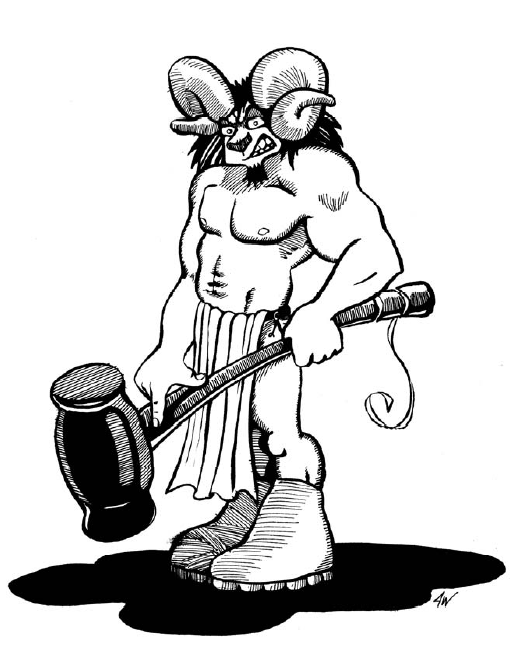
Thread participation! Would you guys want to pit our heroic corgi against one of the sample characters in combat to the death? Let me know which of Azar the Purple Robed Sorcerer, Roland The Woodland Scout or Fiera the Snap-Toothed Dragon-kin you want to see go into the arena. Alternatively, we can spare Don Corgleone and run two of those chumps against each other.
(Not So) Mortal Combat
Original SA post Donjon - (Not So) Mortal Combat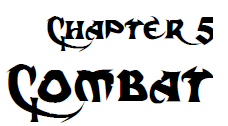
Sorry for the delay. Work's been sort of a mess and this chapter is a pretty serious slog. The example combat I ran with a friend was pretty awful and it sapped my will to continue. But here we go.
Chapter 5 - Combat
Unsurprisingly, Donjon uses its d20 dicepool mechanic for combat. It's used for everything from initiative to attack rolls to damage. You roll a LOT of d20s.
Combat takes place in flurries . It notes that these are full exchanges and doesn't correspond to any particular time frame, which is reasonable and a lot better than 1-6 second bursts that a lot of games try to justify. Flurries count down from 20, ending after the Donjon Master hits 1.
You figure out when during the flurry you get to act by rolling an Initiative Test. This test is your Level + your discernment. This is one of the few tests you don't get to add Abilities to, which I think is for the best. The numbers you roll here are the counts during the flurry where you get to act. This includes multiple actions for rolling the same number.
Combat takes place at a few ranges. These are basically the ranges from 3:16 - Carnage Amongst the Stars. Out of Range, mostly used for retreating, Two Actions Away, One Action Away, and In Close.
Let's try it out! I got a friend of mine to help out and we decided that a flatland brawl between Roland the Woodland Scout and Don Corglione the Anime Corgi would be a simple enough example. We're starting In Close, since both combatants are melee types.
Initiative Test posted:
Roland - 1 7 10 14 16 17 17
Don - 7 7 14 15 19
Roland has fairly high Discernment so he gets more actions. I'll spoil this right now, we quit after count 15.
Flurry 1 - Count 19
Since nobody has an action on 20, we'll skip it and every other one that nobody uses. Don has an action here, so he decides to go on the offensive.
Don's attacking, so his pool is Adroitness and any relevant abilities. In this case he has Use Knife, getting his pool to 5. The Value on his knife is used for damage tests. Roland decides to use an Active Defense or Parry . This lets you sacrifice your next initiative count to strike back and potentially turn the tables and do some damage. Roland drops one of those 17s to try to shank Don right back.
You can only parry melee attacks with a melee weapon or some sort of defensive spell. Attacks from further out can only be dodged.
I'll be putting the character who is acting on top in these examples.
Don's Attack posted:
Don - 1 6 12 14 18
Roland - 2 3 4 7 12 12 16 17 20
Damage tests are Virility + weapon Value + Abilities. Nothing too new here. However, the person taking damage gets a chance to resist. This pool is Wherewithal + armor Value + relevant Abilities. This means that even if they hit, they might not deal lasting damage.
Roland's Damage posted:
Roland - 3 14 16 18 19 20
Don - 3 10 12 13 18 20
Don ties the 20, but the 19 in Roland's pool gives him the tiebreaker and 2 successes. The Law of Successes (1 Success = 1 Fact or 1 Bonus Die) doesn't apply to damage tests. You can only do damage. Normally damage comes out of Flesh Wounds, but you can lose a success to declare that you're applying the rest of your successes to a Attribute. Seeing as how he only has 2 successes, Roland opts to remove 2 of Don's 3 Flesh Wounds. Things are looking bad for our kawaii
Flurry 1 - Count 17
Roland gets to act, since he has a 17 left at this level. If he had defended instead of parried last count, he would be able to act twice here. He takes a swing at Don with his machete and rolls to attack. Don decides he wants that 15 so he doesn't get beat on 3+ counts in a row, so he opts to Passively Defend or dodge . Dodging is Adroitness + Abilites, as per usual.
Roland's Attack posted:
Roland - 2 4 5 12 13 13 14 15 16
Don - 5 7 11 13 17
Flurry 1 - Count 16
Roland gets to act again, since he has a 16 here and Don does not. He takes another swipe.
Roland's Attack posted:
Roland - 2 6 6 9 12 16 18 19 19
Don - 1 4 6 16 19
Don loses handily, so Roland decides to press his advantage and state that Don has Tripped and takes the other two dice as a bonus to his damage test.
Roland's damage posted:
Roland - 3 4 10 16 19 20
Don - 1 2 11 11 14 19
Roland only has one success, so he applies it to Don's remaining Flesh Wound, leaving him at 0. He drops and...
Wait, what?
Chapter 5 posted:
All NPCs fall down unconscious when reduced to zero Flesh Wounds. It takes only one attack, which requires no Test whatsoever, to kill the NPC once he is unconscious. PCs, on the other hand, are treated a bit nicer. They do not collapse at zero Flesh Wounds. Instead, they must have zero Flesh Wounds and be smashed in order to fall unconscious. To smash a PC, the NPC must roll a Damage Test against the PC and have every one of his dice come up as a success. When smashed, PCs fall unconscious, and can be killed with one attack, like NPCs. PCs always roll one die in Damage Tests, even when their Wherewithal is reduced to zero.
So Roland is going to have to WORK to kill our PC. Also important to note is that now that Don doesn't have any Flesh Wounds, Roland can now attack his Attributes without spending successes. An obvious target is Wherewithal to decrease that dice pool for damage, but hitting Adroitness will make them less able to dodge AND less able to run away.
Flurry 1 - Count 15
Don's not down yet and takes another stab at Roland, snarling and snapping at the machete-wielding douchebag kicking his ass. Roland Parries, spending his 14.
Don's Attack posted:
Don - 3 7 8 10 18 19
Roland - 1 1 2 3 4 6 14 15 17
Don takes those successes as bonuses to his damage test.
Don's Damage posted:
Don - 1 1 5 8 9 16 17
Roland - 3 6 9 16 19
Roland toughs it out, taking no damage.
This is where we quit, since just 3 counts took over half an hour. Shuffling around d20s and comparing them is sort of a major pain in the ass when everything requires multiple rolls for resolution.
Moving around in combat
We didn't do any of this during the example, but movement is declared like any other action. If your opponent wants to oppose, say by chasing you as you move back or backing up as you try to close, they can spend a later initiative count to do so. Movement tests are Adroitness + relevant Abilities. If you win, you can move one unit of distance and spend your successes as normal. Moving out of range ends combat. Ranges also act as penalties as normal, close is bad for ranged weapons and melee can only be used in close.
Death
As stated above, NPCs drop at 0 Flesh Wounds, players have to systematically dismantled in order to be killed.
Healing
One die of damage or a Flesh Wound is recovered between scenes, with Attribute damage healing first. Meaning that once you start losing attributes, you're going to KEEP losing them if more combats occur. All damage is recovered between adventures, however.
That's Donjon's combat for you. It's a mess, just like nearly everything else.
Next Time - Magic!
With a bit of reader participation! I need some magic words. Either we'll have a Main Ability like Cast Spells, or a Supporting Ability like Bardic Magic. You get 4 words for a Main and 2 thematic ones for a Supporting.
Azar the Purple-Robed Sorcerer has Cast Spells and the fiery, madness, demon, and cloud. Another example is Shadow Magic with sneaky and tendrils.
Let's do better than that idiot Azar.
I never metamagic I didn't like.
Original SA post
Sorry for the delay on this, but it's time for more
Donjon
!
Donjon - Chapter 6 - I never metamagic I didn't like.
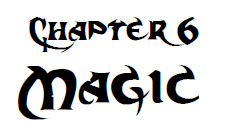
Ok, so now that we know how combat works (spoiler:
It's poorly
), let's talk a little about magic.
Magic in
Donjon
is meant to be fairly flexible and cover most bases, from divine to arcane to psionics. Unlike 5th Edition D&D, you can cast spells as much as you want as long as you don't have to strain yourself. It is "based around a very magical system of dice manipulation and wordplay."
Magic Words
I'll let the game speak for itself here.
Nixon posted:
When you create a character that can cast magic, you get to choose a number of Words that show the types of magic he or she can cast at the beginning of the game. If your character has magic as his Main Ability, choose four Magic Words. These can be any noun, verb, or adjective in your native language. (Articles, such as “a” and “the,” and pronouns, such as “she” and “it,” are right out for obvious reasons. As for adverbs - I never liked them in eighth grade, and I swore I’d have my revenge on them someday. The day is now.)
Casting Spells
In order to cast a spell, you need to spend some time gathering power. You don't need to know what you're going to cast, you just need to spend at least one action gathering magic to use. It's an Easy uncontested action (GM has a 0 dice pool, so it's just the Donjon's level in dice) unless there are extenuating circumstances which make it harder. It's just Cerebrality + your magic Ability against that number. If you want more power, you can spend further actions, but you take a cumulative penalty to your magic Ability each time. GM successes in subsequent tests can come out of your already-earned power.
Gathering Power
Successes here give you Spell Dice. You can spend these like normal successes or use them to power up your spell. There's a roleplaying gimmick here that encourages you to have your character be really obvious when he's drawing or storing magical power. Halos of light, demon shadows, whatever's appropriate. Holding onto Spell Dice also gives the GM bonuses to all active rolls you make, since you have to concentrate to hold them. Dodging and taking damage is about it. Speaking of taking damage, if you are hit while holding spell power, you have to make a Test to hold onto it. In this case it's Wherewithal + your magic Ability vs the number of spell dice + the damage successes. You have to do this even if they don't roll any damage successes.
So basically you gather power and store it until you're ready to unleash the fucking fury on someone. It seems REALLY risky, given what we know about the way Donjon's dice pools work.
Defining the Spell
Now for the fun part. You have to name it first, using your Magic Words. You pick how many you want to use and pay for them out of your spell dice. Your first word's free and you have to pay extra for each other one. The spell costs table and the text differ here. The text says it's one die per word, but the table is double the number of words above one. You get to decide what the effects of each are. For example, the word "fog" could be an actual cloud to cover an escape, a mental fog to distract people or even an acid fog to deal damage to enemies. If you push the definition too far (like the acid fog) the GM gets 3 bonus dice for rolls.
Let's take a look at that spell table.
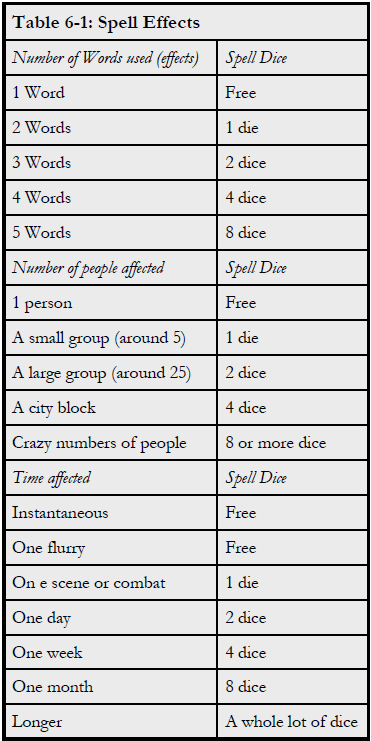
Like I said, it blatantly disagrees with the text for spell words, but 8 dice seems like it would absurdly hard to even get the power for.
The tradeoff for all this nonsense is that you don't have to roll to hit. You skip straight to damage tests or saves. One of the example spells is Azar getting 2 Spell dice, taking his one free word as 'fiery' and casting Azar's Fiery Cascade at a bandit leader with the two spell dice as bonuses. He gets 5 successes on his damage test and kills the bandit outright. The other examples are using 'reversal' to cast Undeniable Racial Role Reversal to charm some goblins for day and a surprisingly awesome one that I'll just put here.
Donjon posted:
Example 3: a complicated spell, indeed
As the group of characters travels on, they later run into a group of nasty trolls. Ron, Robin, and Jonathan realize their characters don't have much of a chance against these guys, and Ron decides to have Azar cast a spell to get rid of them all. Robin and Jonathan have Roland and Fiera distract the trolls while Ron has Azar stand back and gather Magic Power. In three actions, he's built up 10 Spell Dice. He decides to use four Words: fiery, cloud, madness, and gnawing (his newest Word.) That takes three Spell Dice out of the mix. He's also going to affect the entire group of four trolls, so that takes another Spell Die, leaving him with six. He casts "Hellish Fiery Cloud of Gnawing Madness," and the effects are:
Fiery : He's going to do damage to the trolls.
Cloud : This should make an actual fiery cloud around the trolls, reducing their chances of seeing him.
Gnawing : The cloud will inspire hunger in the trolls.
Madness : Lastly, the spell should confuse the trolls into attacking and eating the first thing the see (hopefully, each other.)
Each troll will have to roll against each effect. They'll first roll Wherewithal in a Damage Test. (They would normally roll Wherewithal, plus their "Regenerate" Main Ability, but they have a weakness against fire.) They then roll Wherewithal plus Save versus Poison, Polymorph, and Transmogrification in order to not be blinded; Wherewithal plus the Saving Throw again in order to resist hunger; and then Discernment plus Save versus Illusion and Confusion to not be driven mad.
Ron will roll his Cerebrality plus "Casting Spells" Ability plus six bonus dice only once, and all the trolls' rolls will be compared against that.
So adding more words adds more effects, which would explain why adding them would get so expensive.
Since what needs to be rolled by the GM is going to be sort of ad-hoc, the book gives you a list of suggestions that all make sense. Damage spells go to damage tests, physically affecting spells go against Save versus Poison, Polymorph, and Transmogrification, and mind-affecting spells are opposed by Save versus Illusion and Confusion.
Spells cast on willing allies are rolled against an appropriate unopposed check, based on difficulty. Healing spells could be against current wounds. It's pretty freeform, which is both kind of nice and kind of a hinderance since you will probably have to make up what you're rolling fairly frequently.
Thread Suggestions!
Tasoth posted:
I meant to suggest something.
Cacophony, Miasma, Obliterating and Safe.
HitTheTargets posted:
I'll toss in Luck and Pluck for our Support words. So, you, know Bardic magic.
So we have a Main Ability and a Supporting ability set. Let's start with our Bardic set since there's fewer ways to go. Luck and Pluck would both work well by themselves. A luck effect (Lucky Day, maybe) could be adding the number of successes to a roll this Flurry or something else. Pluck could apply to attack rolls (Song of Pluck) or be used to make an opponent more likely to leave an opening due to overconfidence .
On to Tasoth's. There's the obvious Obliterating/Miasma combo for dealing damage and adding a mental sluggishness effect. You could pair Safe and Cacophony to add some layers of defense against sonic attacks like siren's songs or what have you. My favorite would be Obliterating and Safe. Crush your foes with a safe! Tasoth's Obliterating Safe is obviously stretching a bit, but I think it's the best pick here.
If anyone else has a better idea what to do with these, feel free to post it. Ridiculous names preferred.
Magic Items
Last, but not least, is the one-page overview of magic items. Basically, to create them, you need to spend the Worth of the item, determined by the bonuses/penalties it gives. You then gather power as normal, then roll Cerebrality + Ability + Spell Dice vs Worth of the Item. Successes are what's left over and can be added to your Wealth. Nothing too exciting overall here.
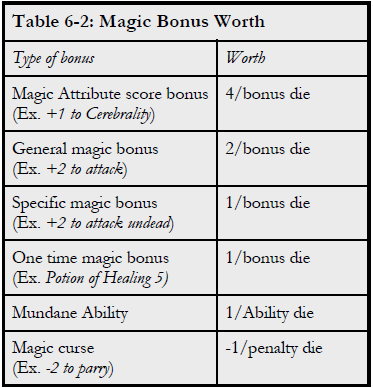
Next time! Chapter 7 - Running the game!
This should be good.